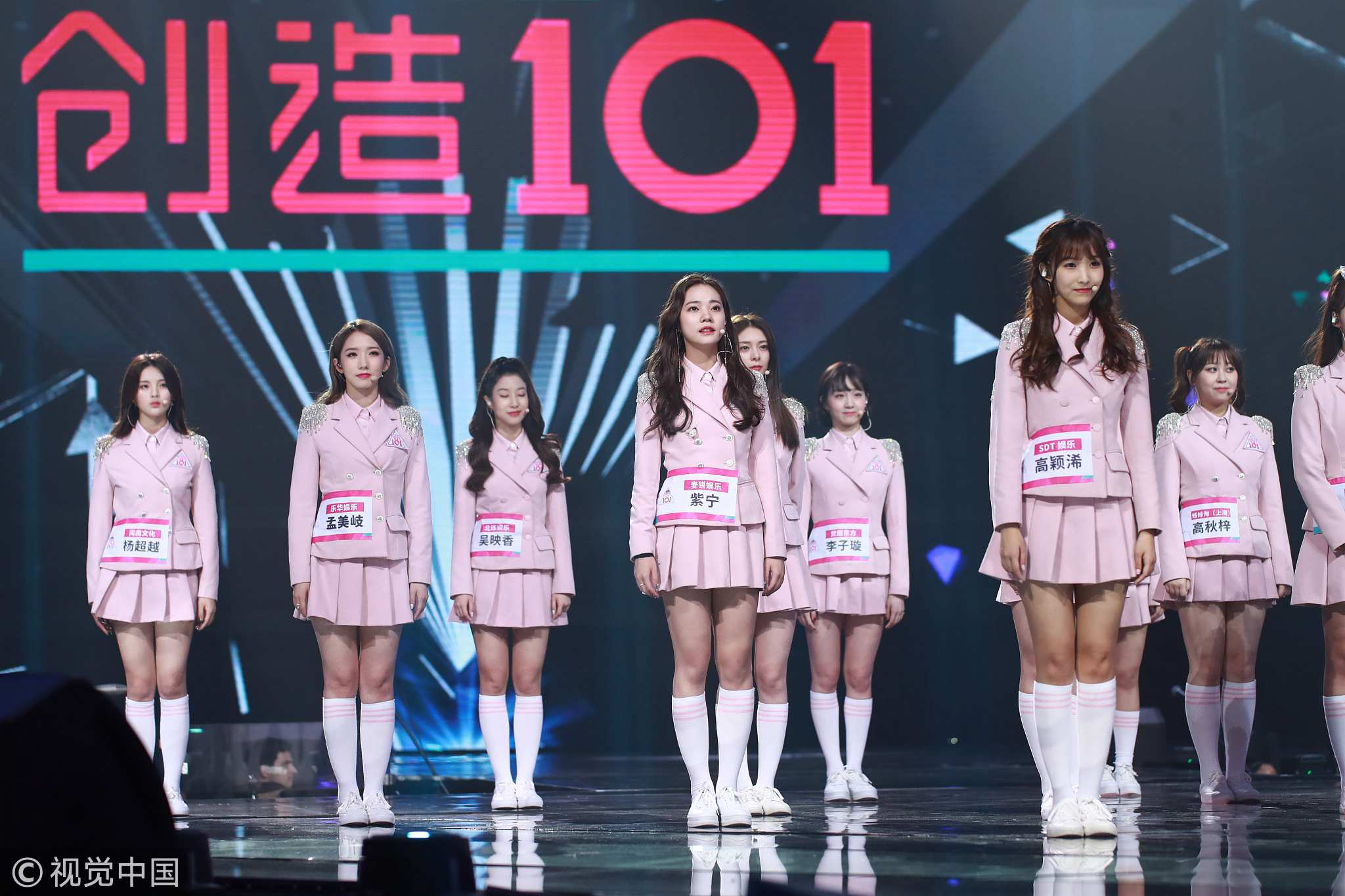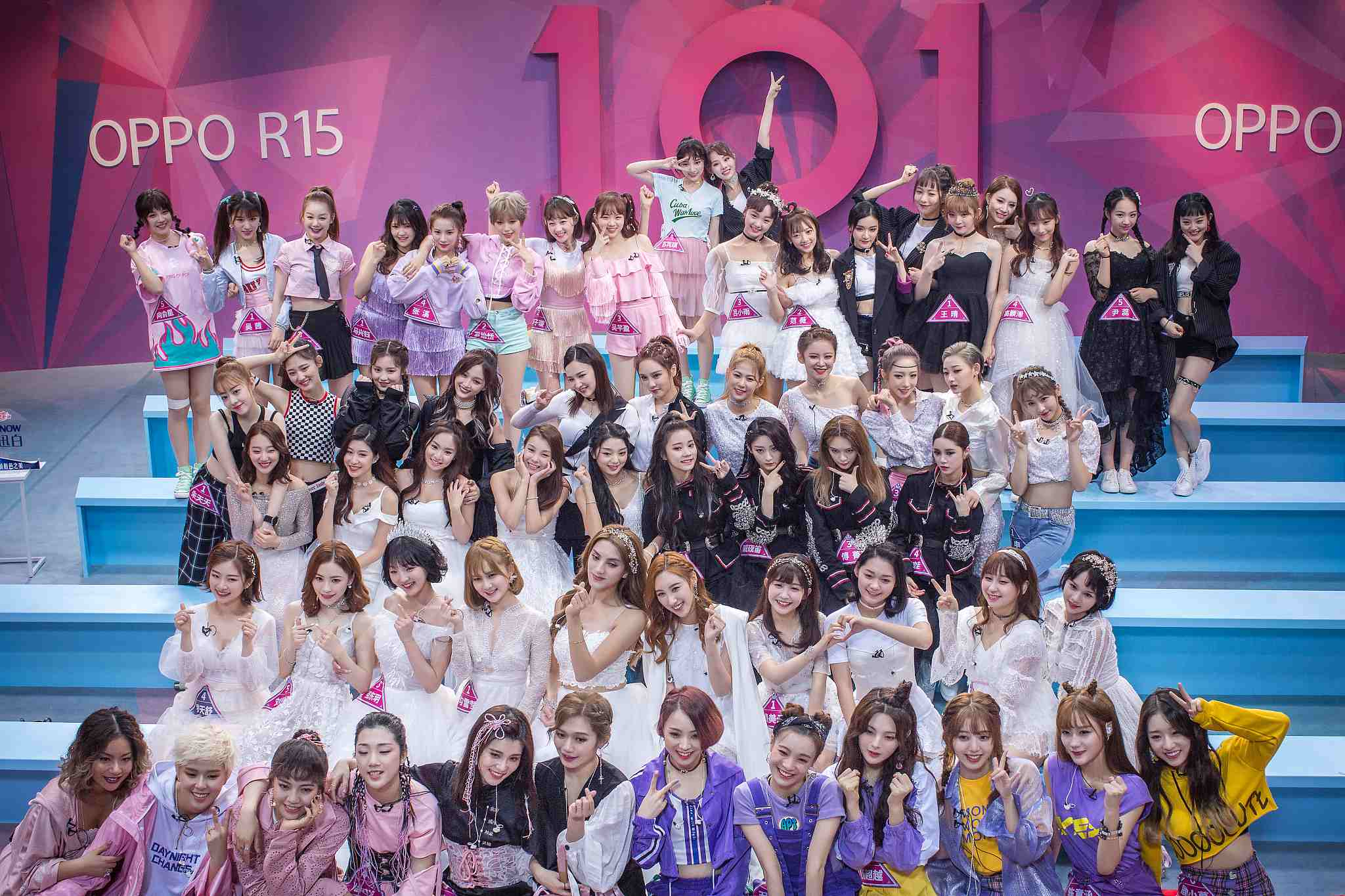
Showbiz
23:04, 06-Oct-2018
China's 'idol-making industry' seeks own identity amid strong regional influences
Updated
22:16, 09-Oct-2018
By Ren Xueqian
03:15

A 10 episode Chinese series of South Korea's hit talent survival show "Produce 101" garnered close to five billion views when it was aired via online streaming platforms between April and June.
Backed by tech giant Tencent, the show aimed to pick 11 finalists out of more than 100 contestants to debut in a pop girl group.
With stakes high, the elimination rate was very high for those female contestants or "idol trainees."

Competitors perform onstage during the shooting of "Produce 101". /VCG Photo
Competitors perform onstage during the shooting of "Produce 101". /VCG Photo
"The show only picked 101 contestants out of more than 13,000 auditions, that's less than a one-percent chance of making the cut," said Cao Yongshou, president of Beijing AIMan Data Technology.
In a male version of the Chinese spin-off, created by and streamed on Baidu's iQiyi, the competition was only slightly easier.
"Idol Producer" selected 100 contestants out of 1,908, so there was a five-percent chance of making the cut there. "If you look at our quarterly report in March, the success rate of male trainees is higher, while the rate for female trainees is lower," Cao said.

Competitors practice dancing in the shooting of "Produce 101". /VCG Photo
Competitors practice dancing in the shooting of "Produce 101". /VCG Photo
In addition to high elimination rates, the style of the trainees also sparked debate, with fans pointing out similarities between the Chinese and Korean idols.
As a former contestant on iQiYi's "Idol Producer", Lin Chaoze disagrees with such comparison.
"I think a lot of artists both old and new in China are incorporating Chinese styles into their music, so I don't really think there is a K-pop undertone among Chinese artists," said Lin.
And others attributed the similarities to South Korea's growing dominance in pop culture.
"China has never really done anything similar to what South Korea has done with its idol-industry, so if South Korea has more experience in that area, then it's natural for people to pay attention to it," said Wang Ju, former "Produce 101" contestant.

Competitors pose for a photo during the show. /VCG Photo
Competitors pose for a photo during the show. /VCG Photo
As views on the matter vary between Chinese artists, one industry insider took a positive standpoint and said controversies that arise from cultural integration are necessary for the continued growth of China's idol industry.
"I think the creation of any cultural product starts from cultural integration and controversies that arise from it. It's through this that we learn about our differences and get a clearer idea of what we need to do to create and innovate. So I don't see this as such a bad thing," said Chen Yuetian, a partner at Sea of Stars Capital.
And creativity, in the eyes of another expert, is important in fostering a trademark that will be distinctive to China's own idol industry.
"When the industry grows to a certain scale, innovation and creativity will become the new focus. I think it's a natural process, but we need to start thinking about how to improve the production process and the influences of our own cultural products right now,” said Ye Feng, deputy dean of School of Digital Media at the Beijing Film Academy.

Competitors pose for a photo during the show. /VCG Photo
Competitors pose for a photo during the show. /VCG Photo
With K-pop undertone or not, the trainees who competed in these talent shows say they have all achieved something out of the experience. Even if they missed the chance to officially debut as performing artists.
"This show has brought me many opportunities to showcase myself to the world. So I think I won in other ways," said Qiang Dongyue, former "Produce 101" contestant.
For former modeling management assistant, turned popular idol trainee, Wang Ju, she's now busy with her own studio, proving to her fans how much she can accomplish even without winning the competition.
"I feel 'Produce 101' has put my life back on track. The show helped me understand myself better. I treasure that experience and the memories, it was a turning point for me, and it was undeniably a life-changing experience," Wang said.
And this opportunity might be a turning point for China as well. While its idol industry is actively searching for a new identity and a trademark of its own, experts say much work remains for it to stand out from regional competitors.

SITEMAP
Copyright © 2018 CGTN. Beijing ICP prepared NO.16065310-3
Copyright © 2018 CGTN. Beijing ICP prepared NO.16065310-3